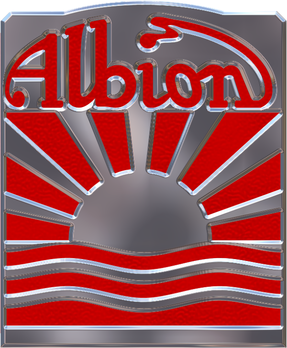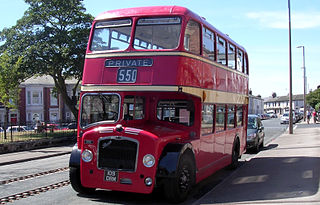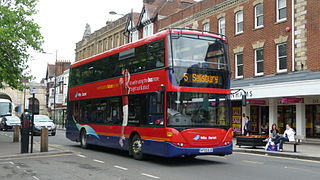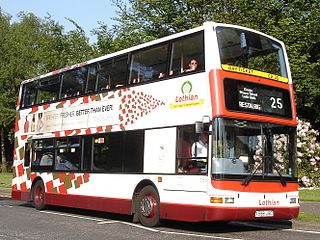
The Dennis Dominator was Dennis's first rear-engined double-decker bus chassis, it was launched in 1977.

Albion Motors was a Scottish automobile and commercial vehicle manufacturer.

The Leyland Olympian was a 2-axle and 3-axle double-decker bus chassis manufactured by Leyland between 1980 and 1993. It was the last Leyland bus model in production.

The Leyland Atlantean is a predominantly double-decker bus chassis manufactured by Leyland Motors between 1958 and 1986. Only 17 Atlantean chassis were bodied as single deck from new.

The Bristol VR was a rear-engined double-decker bus chassis which was manufactured by Bristol Commercial Vehicles as a competitor to the Leyland Atlantean and Daimler Fleetline.

The Bristol Lodekka was a half-cab low-height step-free double-decker bus built by Bristol Commercial Vehicles in England. It was the first production bus design to have no step up from the passenger entrance throughout the lower deck; although Gilford and Leyland Motors had developed low floor city buses in the 1930s, these did not enter production.

Maidstone & District Motor Services was a bus company based in Maidstone, Kent. The company operated bus and coach services in Mid and West Kent and East Sussex from 1911 until 1998. The company's surviving operations were absorbed into Arriva Southern Counties.

Southdown Motors Services Ltd was a bus and coach operator in East and West Sussex and parts of Hampshire, in southern England. It was formed in 1915 and had various owners throughout its history, being purchased by the National Bus Company (NBC) in 1969. The company fleet name was lost when it was acquired by the Stagecoach Group in 1989 but buses operated under that legal name until 2015 when the operating licence was transferred to another company within the Stagecoach Group and 1915 company became dormant but still owned by the Stagecoach Group.

Charles H Roe was a Yorkshire coachbuilding company. It was for most of its life based at Crossgates Carriage Works, in Leeds.

Hants & Dorset Motor Services Ltd was a stage carriage bus service operator in southern England between 1920 and 1983.
A lowbridge double-deck bus is a double-decker bus that has an asymmetric interior layout, enabling the overall height of the vehicle to be reduced compared to that of a conventional double-decker bus. The upper-deck gangway is offset to one side of the vehicle, normally the offside, and is sunken into the lower-deck passenger saloon. Low railway bridges and overpasses are the main reason that a reduced height is desired.

Barton Transport was a bus company that operated in Nottinghamshire from 1908 until 1989.

South Notts Bus Company was a bus company operating in Nottinghamshire from 1926 until 1991 when sold to Nottingham City Transport who continue to use the brand name today.

The Daimler Fleetline is a rear-engined double-decker bus chassis which was built between 1960 and 1983.

The East Lancs EL2000 is a type of single-decker bus body built on a wide variety of bus chassis by East Lancashire Coachbuilders.

The Northern Counties Paladin, also badged as the Plaxton Paladin towards the end of production, is a step-entrance single-decker bus body built by Northern Counties of Wigan, UK, between 1991 and 1998. The replacements for the Paladin are the Prestige and the Pointer as low-floor models for the Paladin LF.

Ribble Motor Services was a large regional bus operator in North West England based in Preston.

Wilts & Dorset is a bus and coach operator providing services in East Dorset, South Wiltshire, and West Hampshire. It operates services under the morebus brand around Bournemouth and Poole, and under the Salisbury Reds brand around Salisbury and Amesbury. It is part of Go South Coast, a subsidiary of the Go-Ahead Group.

Lothian Buses is the largest provider of bus services in and around Edinburgh, the capital city of Scotland. It is entirely municipally owned, being 91% owned by the City of Edinburgh Council, with the remainder owned by Midlothian, East Lothian and West Lothian councils. Lothian Buses plc is registered in Annandale Street, Edinburgh as company number SC096849.

King Alfred Motor Services was a bus and coach operator based in Winchester, England, between 1920 and 1973.
























